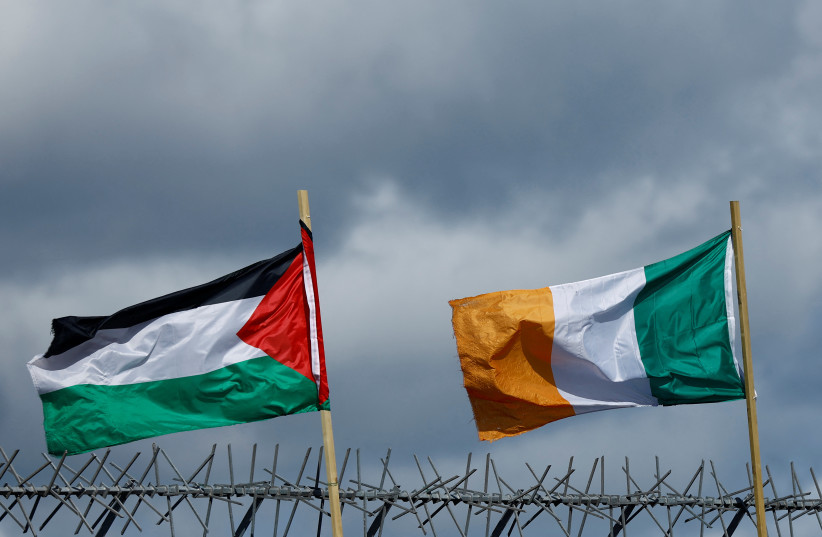Ireland is set to announce the recognition of a Palestinian state on Wednesday, following a similar move made hours earlier by Norway. Spanish Prime Minister Pedro Sanchez also plans to announce Spain’s recognition of an independent Palestinian state on the same day.
"Today, Ireland, Norway, and Spain are announcing that we recognize the state of Palestine," said Irish Prime Minister Simon Harris at a press conference. "Each of us will now undertake the necessary national steps to give effect to that decision. I’m confident that further countries will join us in taking this important step in the coming weeks."
Ireland and Palestine have maintained official relations since 2000, with Ireland establishing a representative office in Ramallah and Palestine maintaining one in Dublin. Both nations are members of the Union for the Mediterranean.
However, the relationship between Ireland and Palestine dates back much further. The Irish nationalist movement has long viewed the Palestinian cause through a similar lens of seeking to overthrow what they see as oppressive colonizers and achieve independent statehood, particularly aligning the Irish Republican Army (IRA) with the Palestinian Liberation Organization (PLO.)

'IRA-PLO one struggle'<br><br><br>
The connection between the Northern Ireland-based IRA and the PLO was most evident in the 1970s and early 1980s, often depicted in murals in nationalist areas. A notable example in Belfast showed armed IRA and PLO members with the slogan "IRA-PLO one struggle." Sinn Féin linked its political strategy with movements like the ANC and PLO to provide a broader political context for its efforts. This alignment was regularly featured in the Sinn Féin newspaper An Phoblacht and grew stronger under Adams' leadership in the 1980s.
In 1980, Ireland became the first EU member state to support the establishment of a Palestinian state. In 1999, then-Taoiseach Bertie Ahern visited Gaza, meeting PLO chief Yasser Arafat and touring the Jabaliya refugee camp, becoming the first national leader to fly directly from Palestine to their home country. In 2001, Foreign Affairs Minister Brian Cowen also visited Gaza to meet Arafat.
Despite significant support for Palestine within Ireland, the government has yet to implement the 2014 decision to formalize diplomatic relations, preferring a coordinated EU approach. However, in April 2024, Foreign Minister Micheál Martin announced plans to recognize a Palestinian state within weeks.
Former Irish PM Leo Varadkar acknowledged differing views between the US and Ireland regarding the Israel-Hamas conflict, particularly concerning Israeli actions in Gaza.
In 2009, Northern Ireland's Sinn Féin leader Gerry Adams' meeting with Hamas highlighted the longstanding ties between Irish Republicanism and Middle Eastern groups. This relationship began in the early 1970s with Libya’s support for the IRA. The IRA’s connections extended to Hezbollah, influencing tactics used in both Lebanon and Northern Ireland. The most enduring relationship was with the PLO, which trained IRA operatives.
Since the official end of the IRA's armed campaign in 2005, mainstream Republican support for Palestine has been political. While Sinn Féin remains critical of Israel, accusing it of human rights violations, leaders like Gerry Adams publicly adopt a more moderate tone. Sinn Féin calls for EU sanctions against Israel and supports the Palestinian cause through various platforms.
Irish Republicanism’s anti-Israel stance has sometimes been accused of antisemitism. Historically, figures like Arthur Griffith and elements within the IRA expressed antisemitic views. Although overt antisemitism has decreased since the late 1960s, anti-Israel rhetoric sometimes crosses the line, reflecting an underlying historical bias.
Graffiti and murals in Republican areas during the second intifada often glorified Palestinian terrorism, and some Republicans suggested arming Palestinians with decommissioned IRA weapons. While modern Irish Republicanism may not be inherently antisemitic, its century-old undercurrent persists, influencing its stance on Israel and the Jewish people.
In January 2011, Ireland granted diplomatic status to the Palestinian delegation in Dublin. Later that year, Ireland’s Foreign Affairs Minister indicated that the country might lead efforts to recognize Palestinian statehood, contingent on the Palestinian Authority gaining full control over its territories. In 2014, both houses of the Irish Parliament passed motions urging the Government to recognize the State of Palestine.
Today, this has finally come to fruition.
